Obey God and His Messenger = Obey Hadith
Probably the most typical argument against following the Quran alone is the argument that when the Quran says to “obey God and His messenger,” this means we have to uphold the Hadith. The fallacy in this argument is that the traditionalists who make this argument are presupposing that the Hadith are actual narrations from the prophet rather than conjecture that is being falsely attributed to the prophet.
For example, traditionalists love to cite the following verse for this argument.
[4:59] O you who believe, you shall obey GOD, and you shall obey the messenger, and those in charge among you. If you dispute in any matter, you shall refer it to GOD and the messenger, if you do believe in GOD and the Last Day. This is better for you, and provides you with the best solution.
يَـٰٓأَيُّهَا ٱلَّذِينَ ءَامَنُوٓا۟ أَطِيعُوا۟ ٱللَّهَ وَأَطِيعُوا۟ ٱلرَّسُولَ وَأُو۟لِى ٱلْأَمْرِ مِنكُمْ فَإِن تَنَـٰزَعْتُمْ فِى شَىْءٍ فَرُدُّوهُ إِلَى ٱللَّهِ وَٱلرَّسُولِ إِن كُنتُمْ تُؤْمِنُونَ بِٱللَّهِ وَٱلْيَوْمِ ٱلْـَٔاخِرِ ذَٰلِكَ خَيْرٌ وَأَحْسَنُ تَأْوِيلًا
Yet, they fail to notice the immediate next verse.
[4:60] Have you noted those who claim that they believe in what was revealed to you, and in what was revealed before you, then uphold the unjust laws of their idols? They were commanded to reject such laws. Indeed, it is the devil’s wish to lead them far astray.
أَلَمْ تَرَ إِلَى ٱلَّذِينَ يَزْعُمُونَ أَنَّهُمْ ءَامَنُوا۟ بِمَآ أُنزِلَ إِلَيْكَ وَمَآ أُنزِلَ مِن قَبْلِكَ يُرِيدُونَ أَن يَتَحَاكَمُوٓا۟ إِلَى ٱلطَّـٰغُوتِ وَقَدْ أُمِرُوٓا۟ أَن يَكْفُرُوا۟ بِهِۦ وَيُرِيدُ ٱلشَّيْطَـٰنُ أَن يُضِلَّهُمْ ضَلَـٰلًۢا بَعِيدًا
In the book “Hadith Muhammad’s Legacy in Medieval and Modern World” by Professor Jonathan Brown, on page 165, it states:
“When Sunni legal theory matured in the eleventh century, it was accepted that, although ahad( i.e., non-massively transmitted) hadiths did not yield epistemological certainty (yaqin) that the Prophet had made that statement, they did yield a very strong probability ( zann ). This was sufficient for fixing law and ritual. While almost all legal hadiths were ahad, the Quran was epistemologically certain, massively transmitted from the time of the Prophet.“
Sunnis admit that their Hadith corpus, at best, is conjecture (zann / ظَّنَّ ), and what does the Quran tell us about conjecture (zann)?
[6:116] If you obey the majority of people on earth, they will divert you from the path of GOD. They follow only conjecture (l-ẓana); they only guess.
وَإِن تُطِعْ أَكْثَرَ مَن فِى ٱلْأَرْضِ يُضِلُّوكَ عَن سَبِيلِ ٱللَّهِ إِن يَتَّبِعُونَ إِلَّا ٱلظَّنَّ وَإِنْ هُمْ إِلَّا يَخْرُصُونَ
[6:148] The idol worshipers say, “Had GOD willed, we would not practice idolatry, nor would our parents, nor would we prohibit anything.” Thus did those before them disbelieve, until they incurred our retribution. Say, “Do you have any proven knowledge that you can show us? You follow nothing but conjecture (zann); you only guess.”
سَيَقُولُ ٱلَّذِينَ أَشْرَكُوا۟ لَوْ شَآءَ ٱللَّهُ مَآ أَشْرَكْنَا وَلَآ ءَابَآؤُنَا وَلَا حَرَّمْنَا مِن شَىْءٍ كَذَٰلِكَ كَذَّبَ ٱلَّذِينَ مِن قَبْلِهِمْ حَتَّىٰ ذَاقُوا۟ بَأْسَنَا قُلْ هَلْ عِندَكُم مِّنْ عِلْمٍ فَتُخْرِجُوهُ لَنَآ إِن تَتَّبِعُونَ إِلَّا ٱلظَّنَّ وَإِنْ أَنتُمْ إِلَّا تَخْرُصُونَ
[10:36] Most of them follow nothing but conjecture (zann), and conjecture is no substitute for the truth. GOD is fully aware of everything they do.
وَمَا يَتَّبِعُ أَكْثَرُهُمْ إِلَّا ظَنًّا إِنَّ ٱلظَّنَّ لَا يُغْنِى مِنَ ٱلْحَقِّ شَيْـًٔا إِنَّ ٱللَّهَ عَلِيمٌۢ بِمَا يَفْعَلُونَ
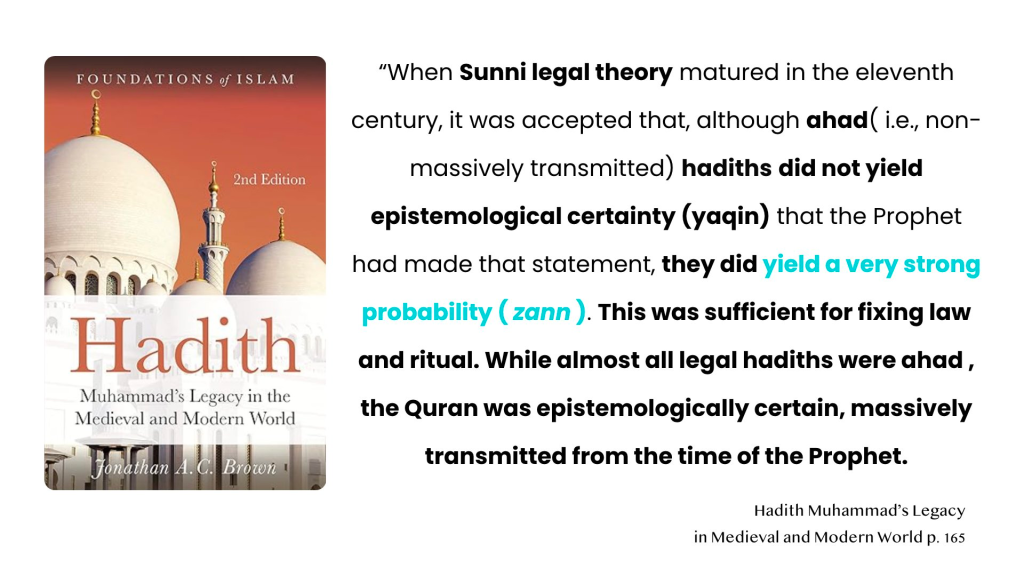
Additionally, a careful look at the Quran informs us that if we want to obey and follow the path of the messenger, the way we do this is by upholding the Quran alone.
[25:27] The day will come when the transgressor will bite his hands (in anguish) and say, “Alas, I wish I had followed the path with the messenger.
وَيَوْمَ يَعَضُّ ٱلظَّالِمُ عَلَىٰ يَدَيْهِ يَقُولُ يَـٰلَيْتَنِى ٱتَّخَذْتُ مَعَ ٱلرَّسُولِ سَبِيلًا
[25:28] “Alas, woe to me, I wish I did not take that person as a friend.
يَـٰوَيْلَتَىٰ لَيْتَنِى لَمْ أَتَّخِذْ فُلَانًا خَلِيلًا
[25:29] “He has led me away from the message after it came to me. Indeed, the devil lets down his human victims.”
لَّقَدْ أَضَلَّنِى عَنِ ٱلذِّكْرِ بَعْدَ إِذْ جَآءَنِى وَكَانَ ٱلشَّيْطَـٰنُ لِلْإِنسَـٰنِ خَذُولًا
[25:30] The messenger said, “My Lord, my people have deserted this Quran.”
وَقَالَ ٱلرَّسُولُ يَـٰرَبِّ إِنَّ قَوْمِى ٱتَّخَذُوا۟ هَـٰذَا ٱلْقُرْءَانَ مَهْجُورًا
Additional articles explainng how obeying the messenger does not mean following the Hadith can be found below.
Hikma = Sunnah
Another common argument is that when it is stated that the messenger delivered the scripture (Kitab) and wisdom (Hikma), the Hikma is implying the Sunnah.
The word Hik’ma ( الْحِكْمَة ), which is typically translated as wisdom throughout the Quran, is almost always mentioned in association with the scripture (kitab) (See: 2:129, 2:151, 2:231, 3:48, 3:81, 3:164, 4:54, 4:113, 5:110, 6:89, 45:16, 62:2).
[2:129] “Our Lord, and raise among them a messenger to recite to them Your revelations, teach them the scripture and wisdom, and purify them. You are the Almighty, Most Wise.”
رَبَّنَا وَابْعَثْ فِيهِمْ رَسُولًا مِنْهُمْ يَتْلُو عَلَيْهِمْ آيَاتِكَ وَيُعَلِّمُهُمُ الْكِتَابَ وَالْحِكْمَةَ وَيُزَكِّيهِمْ إِنَّكَ أَنْتَ الْعَزِيزُ الْحَكِيمُ
If we accept the traditionalist’s interpretation that the Hikma is something other than the Quran, then this would mean that God’s word does not contain wisdom. Such implications would be comically absurd. When we study the Quran, we see that Hikma is not something external to the Quran but something contained within the Quran.
[36:2] And the Quran full of wisdom (l-ḥakīmi).
(٢) وَٱلْقُرْءَانِ ٱلْحَكِيمِ
[3:58] These are the revelations that we recite to you, providing the Reminder full of wisdom.
(٥٨) ذَٰلِكَ نَتْلُوهُ عَلَيْكَ مِنَ ٱلْـَٔايَـٰتِ وَٱلذِّكْرِ ٱلْحَكِيمِ
[43:1] H. M.
[43:2] And the enlightening scripture.
[43:3] We have rendered it an Arabic Quran, that you may understand.
[43:4] It is preserved with us in the original master, honorable and full of wisdom.
(١) حم
(٢) وَالْكِتَابِ الْمُبِينِ
(٣) إِنَّا جَعَلْنَاهُ قُرْآنًا عَرَبِيًّا لَعَلَّكُمْ تَعْقِلُونَ
(٤) وَإِنَّهُ فِي أُمِّ الْكِتَابِ لَدَيْنَا لَعَلِيٌّ حَكِيمٌ
[10:1] A. L. R. These (letters) are the proofs of this book of wisdom.
(١) الر تِلكَ آياتُ الكِتابِ الحَكيمِ
Other articles on this topic can be found below.
Hadith Prophesized and Warned About Quran Alone
Traditionalists love to refer to the following Hadith to argue that the Hadith warns of those who want to follow the Quran alone.
Narrated Al-Miqdam ibn Ma’dikarib: The Prophet (ﷺ) said: Beware! I have been given the Qur’an and something like it, yet the time is coming when a man replete on his couch will say: Keep to the Qur’an; what you find in it to be permissible treat as permissible, and what you find in it to be prohibited treat as prohibited. Beware! The domestic ass, beasts of prey with fangs, a find belonging to confederate, unless its owner does not want it, are not permissible to you If anyone comes to some people, they must entertain him, but if they do not, he has a right to mulct them to an amount equivalent to his entertainment.
حَدَّثَنَا عَبْدُ الْوَهَّابِ بْنُ نَجْدَةَ، حَدَّثَنَا أَبُو عَمْرِو بْنُ كَثِيرِ بْنِ دِينَارٍ، عَنْ حَرِيزِ بْنِ عُثْمَانَ، عَنْ عَبْدِ الرَّحْمَنِ بْنِ أَبِي عَوْفٍ، عَنِ الْمِقْدَامِ بْنِ مَعْدِيكَرِبَ، عَنْ رَسُولِ اللَّهِ صلى الله عليه وسلم أَنَّهُ قَالَ “ أَلاَ إِنِّي أُوتِيتُ الْكِتَابَ وَمِثْلَهُ مَعَهُ أَلاَ يُوشِكُ رَجُلٌ شَبْعَانُ عَلَى أَرِيكَتِهِ يَقُولُ عَلَيْكُمْ بِهَذَا الْقُرْآنِ فَمَا وَجَدْتُمْ فِيهِ مِنْ حَلاَلٍ فَأَحِلُّوهُ وَمَا وَجَدْتُمْ فِيهِ مِنْ حَرَامٍ فَحَرِّمُوهُ أَلاَ لاَ يَحِلُّ لَكُمْ لَحْمُ الْحِمَارِ الأَهْلِيِّ وَلاَ كُلُّ ذِي نَابٍ مِنَ السَّبُعِ وَلاَ لُقَطَةُ مُعَاهِدٍ إِلاَّ أَنْ يَسْتَغْنِيَ عَنْهَا صَاحِبُهَا وَمَنْ نَزَلَ بِقَوْمٍ فَعَلَيْهِمْ أَنْ يَقْرُوهُ فَإِنْ لَمْ يَقْرُوهُ فَلَهُ أَنْ يُعْقِبَهُمْ بِمِثْلِ قِرَاهُ ” .
Sunan Abi Dawud 4604
https://sunnah.com/abudawud:4604
Yet the problem with referencing this Hadith as an argument against following the Quran alone is that there are many more Hadith that go against following Hadith than there are ones warning about following the Quran alone, like the example below.
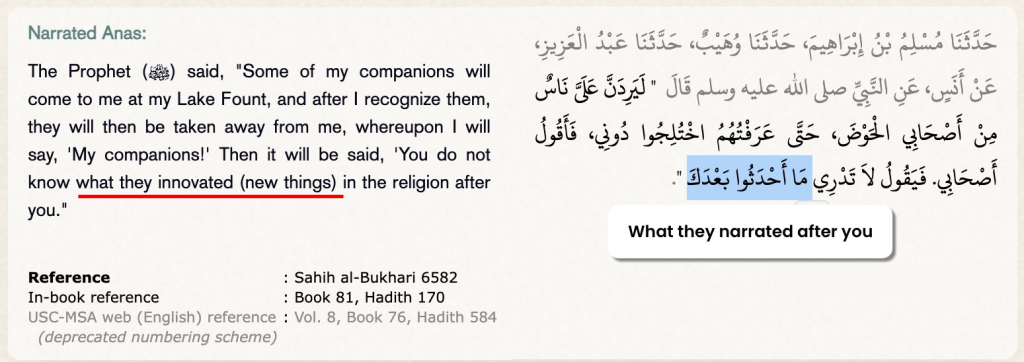
Here is an article for additional anti-Hadith Hadith.
- 19 Hadith Against Sunnah
- The Most Damning Hadith
- Anti-Hadith Hadith of Sahih al-Bukhari
- Using Hadith to argue against Hadith
- List of Anti-Hadith Hadith
Hadith Were Always Narrated Along with the Quran
For the first couple hundred years after the death of the prophet, the main focus for most Muslims was the Quran. Sunni Islam did not become mainstream until around the year 848 CE, during the reign of the Abbasid Caliph Mutawakkil. Before that, people who propagated Hadith were fringe and not mainstream.
Consider that there was no formal effort by any of the first four Caliphs to formally catalog and compile Hadith like they did the Quran. Not only did they not make an effort to preserve the Hadith, but the history of Abu Bakr, Umar, Uthman, and Ali shows that they actively tried to suppress the spread of Hadith.
ABU BAKR AND HADITH
According to a narration some writers report from al-Hakim an-Nisaburi, Aisha stated the following:
Narrated ‘Aisha: My father had collected five hundred hadiths of the Prophet. On the night he did it, he tossed and turned in bed. I asked, “Do you have an illness or have you heard something?” In the morning, he said, “My daughter! Bring me the hadiths that I gave you.” I brought them. He wanted some fire and burned them. When I asked him why he burned them, he said, “I do not want to die having these hadiths with me because I am afraid that there are hadiths that are not originally as they are reported though I heard them from people whom I trust; I am afraid to narrate them that way”
Al-Dhahbiy: Tadhkirat al-Huffadh 1:5
Al-Qasim ibn Muhammad: al-I`tisam bi-Habl-illah al-Matin 1:30
`Abd al-Ghaniy `Abd al-Khaliq: Hijjiyyat al-Sunnah 394
After the demise of the Holy Prophet, Abu-Bakr gathered people and said, ‘You are reporting about the Messenger of Allah inconsistent narrations. People coming after you will be engaged in more intense discrepancy. Therefore, do not report anything about the Messenger of Allah, and if anyone asks you, you should refer to the Book of Allah as the arbitrator. You should thus deem lawful whatever is lawful therein and deem unlawful whatever is unlawful therein.’
Al-Dhahbiy: Tadhkirat al-Huffadh 1:32
`Abd al-Ghaniy Abd al-Khaliq: Hijjiyyat al-Sunnah 394
UMAR AND HADITH
Umar staunchly believed that the Quran was sufficient and was incredibly uptight regarding the spreading of Hadith.
Narrated ‘Ubaidullah bin `Abdullah: Ibn `Abbas said, “When the ailment of the Prophet (ﷺ) became worse, he said, ‘Bring for me (writing) paper and I will write for you a statement after which you will not go astray.’ But `Umar said, ‘The Prophet is seriously ill, and we have got Allah’s Book with us and that is sufficient for us.’ But the companions of the Prophet (ﷺ) differed about this and there was a hue and cry. On that the Prophet (ﷺ) said to them, ‘Go away (and leave me alone). It is not right that you should quarrel in front of me.” Ibn `Abbas came out saying, “It was most unfortunate (a great disaster) that Allah’s Messenger (ﷺ) was prevented from writing that statement for them because of their disagreement and noise.
حَدَّثَنَا يَحْيَى بْنُ سُلَيْمَانَ، قَالَ حَدَّثَنِي ابْنُ وَهْبٍ، قَالَ أَخْبَرَنِي يُونُسُ، عَنِ ابْنِ شِهَابٍ، عَنْ عُبَيْدِ اللَّهِ بْنِ عَبْدِ اللَّهِ، عَنِ ابْنِ عَبَّاسٍ، قَالَ لَمَّا اشْتَدَّ بِالنَّبِيِّ صلى الله عليه وسلم وَجَعُهُ قَالَ ” ائْتُونِي بِكِتَابٍ أَكْتُبُ لَكُمْ كِتَابًا لاَ تَضِلُّوا بَعْدَهُ ”. قَالَ عُمَرُ إِنَّ النَّبِيَّ صلى الله عليه وسلم غَلَبَهُ الْوَجَعُ وَعِنْدَنَا كِتَابُ اللَّهِ حَسْبُنَا فَاخْتَلَفُوا وَكَثُرَ اللَّغَطُ. قَالَ ” قُومُوا عَنِّي، وَلاَ يَنْبَغِي عِنْدِي التَّنَازُعُ ”. فَخَرَجَ ابْنُ عَبَّاسٍ يَقُولُ إِنَّ الرَّزِيَّةَ كُلَّ الرَّزِيَّةِ مَا حَالَ بَيْنَ رَسُولِ اللَّهِ صلى الله عليه وسلم وَبَيْنَ كِتَابِهِ.
Sahih al-Bukhari 114
https://sunnah.com/bukhari:114
It is reported that Umar, during his reign as Caliph, did not allow the free travel of the prophet’s companions without his permission because he did not want them to propagate Hadith. It wasn’t until the reign of Uthman that this ban was lifted, and the companions were allowed to emigrate to some of the newly Muslim-conquered regions.
In Tadhkirat al-huffaz, al-Dhahabi reported from Shu’bah, from Sa’id ibn Ibrahim from his father, that Umar detained Ibn Mas’ud, Abu al-Darda’ and Abu Mas’ud al-Ansari, saying to them: You have narrated hadith abundantly from the Messenger of Allah. It is reported that he had detained them in Medina, but they were set free by Uthman.
Ibn Sa’d and Ibn Asakir reports from Mahmud ibn Labid that he said: I heard Uthman ibn Affan addressing people from over the pulpit: It is unlawful for everyone to narrate any hadith he never heard of during the time of Abu Bakr and that of Umar. Verily that which made me abstain from narrating from the Messenger of Allah was not to be among the most conscious of his Companions, but I heard him declaring: “Whoever ascribing to me something I never said, he shall verily occupy his (destined) abode in Fire.”
ALI AND HADITH
Narrated Abu Juhaifa: I asked Ali, “Do you have the knowledge of any Divine Inspiration (wahi) besides what is in Allah’s Book?” Ali replied, “No, by Him Who splits the grain of corn and creates the soul. I don’t think we have such knowledge, but we have the ability of understanding which Allah may endow a person with, so that he may understand the Qur’an, and we have what is written in this paper as well.” I asked, “What is written in this paper?” He replied, “The understanding, releasing of the captive, and that a Muslim should not be killed by a disbeliever.
حَدَّثَنَا أَحْمَدُ بْنُ يُونُسَ، حَدَّثَنَا زُهَيْرٌ، حَدَّثَنَا مُطَرِّفٌ، أَنَّ عَامِرًا، حَدَّثَهُمْ عَنْ أَبِي جُحَيْفَةَ ـ رضى الله عنه ـ قَالَ قُلْتُ لِعَلِيٍّ ـ رضى الله عنه هَلْ عِنْدَكُمْ شَىْءٌ مِنَ الْوَحْىِ إِلاَّ مَا فِي كِتَابِ اللَّهِ قَالَ وَالَّذِي فَلَقَ الْحَبَّةَ وَبَرَأَ النَّسَمَةَ مَا أَعْلَمُهُ إِلاَّ فَهْمًا يُعْطِيهِ اللَّهُ رَجُلاً فِي الْقُرْآنِ، وَمَا فِي هَذِهِ الصَّحِيفَةِ. قُلْتُ وَمَا فِي الصَّحِيفَةِ قَالَ الْعَقْلُ وَفَكَاكُ الأَسِيرِ، وَأَنْ لاَ يُقْتَلَ مُسْلِمٌ بِكَافِرٍ.
Sahih al-Bukhari 3047
https://sunnah.com/bukhari:3047
For further reading on the subject:
- Excerpts & Thoughts from Hadith Literature by Muhammad Zubayr Siddiqi
- How Hadith and Sunnism Destroyed Islam and Rationality
- Evolution of Hadith Reliance in Sunni Islam
- What do you need to see to renounce Hadith?
- Umar Advocated Quran Alone
- Abu Hurayra
Need Hadith to judge
One common argument made for justification for the upholding of Hadith besides the Quran is that it was the messenger’s job to judge, and it is the duty of the believers to obey his judgment. Some of the strongest verses in the Quran used to attempt to justify these points can be found in the following two verses.
[4:65] Never indeed, by your Lord; they are not believers unless they come to you to judge in their disputes, then find no hesitation in their hearts whatsoever in accepting your judgment. They must submit a total submission.
فَلَا وَرَبِّكَ لَا يُؤْمِنُونَ حَتَّىٰ يُحَكِّمُوكَ فِيمَا شَجَرَ بَيْنَهُمْ ثُمَّ لَا يَجِدُوا۟ فِىٓ أَنفُسِهِمْ حَرَجًا مِّمَّا قَضَيْتَ وَيُسَلِّمُوا۟ تَسْلِيمًا
[33:36] No believing man or believing woman, if GOD and His messenger issue any command, has any choice regarding that command. Anyone who disobeys GOD and His messenger has gone far astray.
وَمَا كَانَ لِمُؤْمِنٍ وَلَا مُؤْمِنَةٍ إِذَا قَضَى ٱللَّهُ وَرَسُولُهُۥٓ أَمْرًا أَن يَكُونَ لَهُمُ ٱلْخِيَرَةُ مِنْ أَمْرِهِمْ وَمَن يَعْصِ ٱللَّهَ وَرَسُولَهُۥ فَقَدْ ضَلَّ ضَلَـٰلًا مُّبِينًا
The error made in thinking these verses support the upholding of Hadith besides the Quran can be understood by asking, “by what mechanism did the messenger judge?” Or put another way, did the messenger judge by the Book of God, or did he judge by some other means that is not contained in the Book of God? What we find when we research the Quran is that the messenger judged by the Quran alone.
More articles on this topic can be found below:
Muhammad Received Revelations outside of Quran
There are numerous examples in the Quran that the prophet received revelations referenced in the Quran that occurred outside the Quran. Below are three examples.
- Changing of the Qibla (2:142-145)
- One of the prophet’s wives spread a hadith from the prophet (66:3)
- The prophet commanded to marry the divorced wife of his adopted son (33:37)
The argument typically goes that since there were revelations outside of the Quran, therefore, we are obliged to accept Hadith. Again, this is a non sequitur because it presupposes that the Hadith we have today are actual sayings from the prophet rather than the conjecture they actually are.
But that aside, the simple rebuttal to this argument is that if we were with the prophet, we would have to obey any command he gave us. This was the responsibility of the people who lived with him, but these revelations that he received were only relevant to his immediate time and place. Any revelation that is binding to people of the future generations will all be encompassed in the Quran. The lessons we are to take from these revelations he received outside of the Quran are all contained within the Quran.
Additionally, there is a field of Hadith known as Asbab al-Nuzul, which is meant to explain the context of the verses when they were revealed. The irony is that these Hadiths often contradict one another. For example, even for the examples above, Hadith is unclear regarding the shift in Qibla direction or what the prophet prohibited for himself to please his wives (66:1). Some narrations claim it was honey, while other narrations claim it was intercourse. Aside from this, there are contradicting Hadith to what the first verse revealed, the last verse revealed, the last sura revealed, as well as numerous other contradictions. So, if the Hadith corpus is sketchy on the items that one would assume should be the best understood, how less reliable are the Hadith for all other matters.
More articles on this topic can be found here:
Hadith is NeEded to explain Quran
If you ask most Muslims: who explains the Quran? They will claim that the prophet explained the Quran through the Hadith. This is because traditionalists believe that without the Hadith, the Quran is incomprehensible.

Except the Hadith does not explain the Quran. You will not find any Hadith that provides a detailed tafsir of three consecutive verses of the Quran. This is because the Hadith is not a Tafsir of the Quran. The Hadith not only does not explain the Quran, but it confuses the Quran for people.
Also, there is another problem with this argument which is that it leads to an infinite regress. If we say we need the Hadith to explain the Quran, then we will also need another entity to explain the Hadith, and another entity to explain that, and…The reality is that God informs us that He has given us the hearing, eyesight, and the brain, and we are responsible for using these faculties if we would like to understand.
[18:57] Who are more evil than those who are reminded of their Lord’s proofs, then disregard them, without realizing what they are doing. Consequently, we place shields on their hearts to prevent them from understanding it (the Quran), and deafness in their ears. Thus, no matter what you do to guide them, they can never ever be guided.
وَمَنْ أَظْلَمُ مِمَّن ذُكِّرَ بِـَٔايَـٰتِ رَبِّهِۦ فَأَعْرَضَ عَنْهَا وَنَسِىَ مَا قَدَّمَتْ يَدَاهُ إِنَّا جَعَلْنَا عَلَىٰ قُلُوبِهِمْ أَكِنَّةً أَن يَفْقَهُوهُ وَفِىٓ ءَاذَانِهِمْ وَقْرًا وَإِن تَدْعُهُمْ إِلَى ٱلْهُدَىٰ فَلَن يَهْتَدُوٓا۟ إِذًا أَبَدًا
The Quran is clear that God Himself explains the Quran, and is the Teacher of the Quran.
[55:1] The Most Gracious.
[55:2] Teacher of the Quran.
(١) ٱلرَّحْمَـٰنُ
(٢) عَلَّمَ ٱلْقُرْءَانَ
God informs us that the sole duty of the messenger was to deliver the message, which is the scripture and not some other source.
[5:99] The sole duty of the messenger is to deliver the message, and GOD knows everything you declare and everything you conceal.
مَا عَلَى الرَّسُولِ إِلَّا الْبَلَاغُ وَاللَّهُ يَعْلَمُ مَا تُبْدُونَ وَمَا تَكْتُمُونَ
[21:10] We have sent down to you a scripture containing your message. Do you not understand?
لَقَدْ أَنزَلْنَآ إِلَيْكُمْ كِتَـٰبًا فِيهِ ذِكْرُكُمْ أَفَلَا تَعْقِلُونَ
More artilces on this topic can be found below:
- Who Explains the Quran?
- God’s Book Has No Partners
- A Complete Book
- Muhammad’s sole duty was to deliver the Quran
The Best Example
A typical ploy for supporters of Hadith is to extract a verse in isolation and draw far-reaching conclusions that the verse is implying to uphold Hadith besides the Quran. An example of this is the following verse.
[33:21] The messenger of GOD has set up a good example for those among you who seek GOD and the Last Day, and constantly think about GOD.
لَّقَدْ كَانَ لَكُمْ فِى رَسُولِ ٱللَّهِ أُسْوَةٌ حَسَنَةٌ لِّمَن كَانَ يَرْجُوا۟ ٱللَّهَ وَٱلْيَوْمَ ٱلْـَٔاخِرَ وَذَكَرَ ٱللَّهَ كَثِيرًا
Before we look at this verse in context, let’s look at another verse that uses the same expression towards Abraham.
| 1 | laqad | لَّقَدْ | Certainly, |
| 2 | kāna | كَانَ | there was |
| 3 | lakum | لَكُمْ | for you [all] |
| 4 | fī | فِى | in |
| 5 | rasūli | رَسُولِ | (the) messenger |
| 6 | l-lahi | ٱللَّهِ | (of) God |
| 7 | us’watun | أُسْوَةٌ | a good example |
| 8 | ḥasanatun | حَسَنَةٌ | good |
[60:4] A good example has been set for you by Abraham and those with him. They said to their people, “We disown you and the idols that you worship besides GOD. We denounce you, and you will see nothing from us except animosity and hatred until you believe in GOD ALONE.” However, a mistake was committed by Abraham when he said to his father, “I will pray for your forgiveness, but I possess no power to protect you from GOD.” “Our Lord, we trust in You, and submit to You; to You is the final destiny.
قَدْ كَانَتْ لَكُمْ أُسْوَةٌ حَسَنَةٌ فِىٓ إِبْرَٰهِيمَ وَٱلَّذِينَ مَعَهُۥٓ إِذْ قَالُوا۟ لِقَوْمِهِمْ إِنَّا بُرَءَٰٓؤُا۟ مِنكُمْ وَمِمَّا تَعْبُدُونَ مِن دُونِ ٱللَّهِ كَفَرْنَا بِكُمْ وَبَدَا بَيْنَنَا وَبَيْنَكُمُ ٱلْعَدَٰوَةُ وَٱلْبَغْضَآءُ أَبَدًا حَتَّىٰ تُؤْمِنُوا۟ بِٱللَّهِ وَحْدَهُۥٓ إِلَّا قَوْلَ إِبْرَٰهِيمَ لِأَبِيهِ لَأَسْتَغْفِرَنَّ لَكَ وَمَآ أَمْلِكُ لَكَ مِنَ ٱللَّهِ مِن شَىْءٍ رَّبَّنَا عَلَيْكَ تَوَكَّلْنَا وَإِلَيْكَ أَنَبْنَا وَإِلَيْكَ ٱلْمَصِي
| 1 | qad | قَدْ | Indeed, |
| 2 | kānat | كَانَتْ | it was |
| 3 | lakum | لَكُمْ | for you [all] |
| 4 | us’watun | أُسْوَةٌ | a good example |
| 5 | ḥasanatun | حَسَنَةٌ | good |
| 6 | fī | فِىٓ | in |
| 7 | ib’rāhīma | إِبْرَٰهِيمَ | Abraham |
| 8 | wa-alladhīna | وَٱلَّذِينَ | and those |
| 9 | maʿahu | مَعَهُۥٓ | with him, |
The natural question is, where is Abraham’s example? The obvious answer is that it is in the Quran. The same goes for the messenger’s example. It is not in another source but in the Quran he gave his life to deliver. If we read the verse in context, we see not only the example of the messenger, but how it contrasts with the example of the hypocrties.
[33:9] O you who believe, remember GOD’s blessing upon you; when soldiers attacked you, we sent upon them violent wind and invisible soldiers. GOD is Seer of everything you do. [33:10] When they came from above you, and from beneath you, your eyes were terrified, your hearts ran out of patience, and you harbored unbefitting thoughts about GOD. [33:11] That is when the believers were truly tested; they were severely shaken up.
[33:12] The hypocrites and those with doubts in their hearts said, “What GOD and His messenger promised us was no more than an illusion!” [33:13] A group of them said, “O people of Yathrib, you cannot attain victory; go back.” Others made up excuses to the prophet: “Our homes are vulnerable,” when they were not vulnerable. They just wanted to flee. [33:14] Had the enemy invaded and asked them to join, they would have joined the enemy without hesitation. [33:15] They had pledged to GOD in the past that they would not turn around and flee; making a pledge with GOD involves a great responsibility. [33:16] Say, “If you flee, you can never flee from death or from being killed. No matter what happens, you only live a short while longer.” [33:17] Say, “Who would protect you from GOD if He willed any adversity, or willed any blessing for you?” They can never find, beside GOD, any other Lord and Master. [33:18] GOD is fully aware of the hinderers among you, and those who say to their comrades, “Let us all stay behind.” Rarely do they mobilize for defense. [33:19] Also, they are too stingy when dealing with you. If anything threatens the community, you see their eyes rolling with fear, as if death had already come to them. Once the crisis is over, they whip you with sharp tongues. They are too stingy with their wealth. These are not believers, and, consequently, GOD has nullified their works. This is easy for GOD to do. [33:20] They thought that the parties might come back. In that case, they would wish that they were lost in the desert, asking about your news from afar. Had the parties attacked you while they were with you, they would rarely support you.
[33:21] The messenger of GOD has set up a good example for those among you who seek GOD and the Last Day, and constantly think about GOD. [33:22] When the true believers saw the parties (ready to attack), they said, “This is what GOD and His messenger have promised us, and GOD and His messenger are truthful.” This (dangerous situation) only strengthened their faith and augmented their submission. [33:23] Among the believers there are people who fulfill their pledges with GOD. Some of them died, while others stand ready, never wavering. [33:24] GOD will surely recompense the truthful for their truthfulness, and will punish the hypocrites, if He so wills, or redeem them. GOD is Forgiver, Most Merciful.
Everything we need to know about the prophet’s example is in the Quran just like it is in the case of Abraham.
Take What the Messenger Gives You
The very common sentence of a verse that is used to attempt to justify Hadith is the following statement:
[59:7]…Take what the messenger gives you, and refrain from what he forbids you from it…
وَمَا نَهَىٰكُمْ عَنْهُ فَٱنتَهُوا۟
| 24 | wamā | وَمَآ | And whatever |
| 25 | ātākumu | ءَاتَىٰكُمُ | [he] gave you [all] |
| 26 | l-rasūlu | ٱلرَّسُولُ | the messenger, |
| 27 | fakhudhūhu | فَخُذُوهُ | so take it [you all] |
| 28 | wamā | وَمَا | and whatever |
| 29 | nahākum | نَهَىٰكُمْ | he forbade you [all] |
| 30 | ʿanhu | عَنْهُ | from it, |
| 31 | fa-intahū | فَٱنتَهُوا۟ | then refrain [you all] |
Traditionalists love to cite this portion of the verse but very conveniently neglect to present the verse in its entirety. If we read this verse from beginning to end we see that the context here is in regards to the spoils of war and has nothing to do with the Hadith.
[59:7] Whatever GOD restored to His messenger from the (defeated) communities shall go to GOD and His messenger (in the form of a charity). You shall give it to the relatives, the orphans, the poor, and the traveling alien. Thus, it will not remain monopolized by the strong among you. You may keep the spoils given to you by the messenger, but do not take what he enjoins you from taking. You shall reverence GOD. GOD is strict in enforcing retribution.
مَّآ أَفَآءَ ٱللَّهُ عَلَىٰ رَسُولِهِۦ مِنْ أَهْلِ ٱلْقُرَىٰ فَلِلَّهِ وَلِلرَّسُولِ وَلِذِى ٱلْقُرْبَىٰ وَٱلْيَتَـٰمَىٰ وَٱلْمَسَـٰكِينِ وَٱبْنِ ٱلسَّبِيلِ كَىْ لَا يَكُونَ دُولَةًۢ بَيْنَ ٱلْأَغْنِيَآءِ مِنكُمْ وَمَآ ءَاتَىٰكُمُ ٱلرَّسُولُ فَخُذُوهُ وَمَا نَهَىٰكُمْ عَنْهُ فَٱنتَهُوا۟ وَٱتَّقُوا۟ ٱللَّهَ إِنَّ ٱللَّهَ شَدِيدُ ٱلْعِقَابِ
This clear concealment of the context of the verse is heavily reprimanded in the Quran.
[2:146] Those who received the scripture recognize the truth herein, as they recognize their own children. Yet, some of them conceal the truth, knowingly.
ٱلَّذِينَ ءَاتَيْنَـٰهُمُ ٱلْكِتَـٰبَ يَعْرِفُونَهُۥ كَمَا يَعْرِفُونَ أَبْنَآءَهُمْ وَإِنَّ فَرِيقًا مِّنْهُمْ لَيَكْتُمُونَ ٱلْحَقَّ وَهُمْ يَعْلَمُونَ
[2:159] Those who conceal our revelations and guidance, after proclaiming them for the people in the scripture, are condemned by GOD; they are condemned by all the condemners.
إِنَّ ٱلَّذِينَ يَكْتُمُونَ مَآ أَنزَلْنَا مِنَ ٱلْبَيِّنَـٰتِ وَٱلْهُدَىٰ مِنۢ بَعْدِ مَا بَيَّنَّـٰهُ لِلنَّاسِ فِى ٱلْكِتَـٰبِ أُو۟لَـٰٓئِكَ يَلْعَنُهُمُ ٱللَّهُ وَيَلْعَنُهُمُ ٱللَّـٰعِنُونَ
[2:174] Those who conceal GOD’s revelations in the scripture, in exchange for a cheap material gain, eat but fire into their bellies. GOD will not speak to them on the Day of Resurrection, nor will He purify them. They have incurred a painful retribution.
إِنَّ ٱلَّذِينَ يَكْتُمُونَ مَآ أَنزَلَ ٱللَّهُ مِنَ ٱلْكِتَـٰبِ وَيَشْتَرُونَ بِهِۦ ثَمَنًا قَلِيلًا أُو۟لَـٰٓئِكَ مَا يَأْكُلُونَ فِى بُطُونِهِمْ إِلَّا ٱلنَّارَ وَلَا يُكَلِّمُهُمُ ٱللَّهُ يَوْمَ ٱلْقِيَـٰمَةِ وَلَا يُزَكِّيهِمْ وَلَهُمْ عَذَابٌ أَلِيمٌ
How Do We Do Salat Without Hadith?
Single-handedly, the most common argument Sunnis give against following the Quran alone is asking, “How do we do Salat without the Hadith?”
The irony of this question is that there is no single Hadith in the Sunni Hadith corpus that explains in detail how to do Salat from start to finish. Not only that, but even if you compiled all the Hadith on the topic and give it to a neutral party for them to reconstruct how to do the Salat from Hadith sources, not only will they be incapable of achieving such an outcome, but the Hadith are highly contradictory regarding even the items of Salat that it supposedly covers.
Even the most basic facts of Salat are in dispute once the Hadith are used as a source. For example, there is uncertainty as to if the Bismillah is part of the Fateah or not and if it should be recited in the Salat. In addition, even the aspects that are discussed in the Quran are neglected by the Sunnis, who favor following the Hadith. For example, the Quran tells the believers to recite their Salat in a moderate tone, yet traditionalists do two of their Salat quietly.
[17:110] Say, “Call Him GOD, or call Him Most Gracious; whichever name you use, to Him belongs the best names.” You shall not utter your Contact Prayers (Salat) too loudly, nor secretly; use a moderate tone.
قُلِ ٱدْعُوا۟ ٱللَّهَ أَوِ ٱدْعُوا۟ ٱلرَّحْمَـٰنَ أَيًّا مَّا تَدْعُوا۟ فَلَهُ ٱلْأَسْمَآءُ ٱلْحُسْنَىٰ وَلَا تَجْهَرْ بِصَلَاتِكَ وَلَا تُخَافِتْ بِهَا وَٱبْتَغِ بَيْنَ ذَٰلِكَ سَبِيلًا
The Quran tells the believers that the ablution is only four steps and what specifically breaks ablution, yet traditionalists have added multiple other steps and ways of nullification beyond what is stated in the Quran.
[5:6] O you who believe, when you observe the Contact Prayers (Salat), you shall: (1) wash your faces, (2) wash your arms to the elbows, (3) wipe your heads, and (4) wash your feet to the ankles. If you were unclean due to sexual orgasm, you shall bathe. If you are ill, or traveling, or had any digestive excretion (urinary, fecal, or gas), or had (sexual) contact with the women, and you cannot find water, you shall observe the dry ablution (Tayammum) by touching clean dry soil, then rubbing your faces and hands. GOD does not wish to make the religion difficult for you; He wishes to cleanse you and to perfect His blessing upon you, that you may be appreciative.
يَـٰٓأَيُّهَا ٱلَّذِينَ ءَامَنُوٓا۟ إِذَا قُمْتُمْ إِلَى ٱلصَّلَوٰةِ فَٱغْسِلُوا۟ وُجُوهَكُمْ وَأَيْدِيَكُمْ إِلَى ٱلْمَرَافِقِ وَٱمْسَحُوا۟ بِرُءُوسِكُمْ وَأَرْجُلَكُمْ إِلَى ٱلْكَعْبَيْنِ وَإِن كُنتُمْ جُنُبًا فَٱطَّهَّرُوا۟ وَإِن كُنتُم مَّرْضَىٰٓ أَوْ عَلَىٰ سَفَرٍ أَوْ جَآءَ أَحَدٌ مِّنكُم مِّنَ ٱلْغَآئِطِ أَوْ لَـٰمَسْتُمُ ٱلنِّسَآءَ فَلَمْ تَجِدُوا۟ مَآءً فَتَيَمَّمُوا۟ صَعِيدًا طَيِّبًا فَٱمْسَحُوا۟ بِوُجُوهِكُمْ وَأَيْدِيكُم مِّنْهُ مَا يُرِيدُ ٱللَّهُ لِيَجْعَلَ عَلَيْكُم مِّنْ حَرَجٍ وَلَـٰكِن يُرِيدُ لِيُطَهِّرَكُمْ وَلِيُتِمَّ نِعْمَتَهُۥ عَلَيْكُمْ لَعَلَّكُمْ تَشْكُرُونَ
In the most noteworthy example of the Tashahud, a statement that the prophet must have made hundreds of thousands of times, we have about nine different narrations, with each person claiming that it was taught to them no differently than the verse of the Quran. If the Hadith is inconsistent on these most basic statements repeated this many times, how less reliable will it be for all other narrations?
Additional Articles on this topic:
- Bismillah & Salat
- Tashahhud & Hadith
- Amin and Salat
- Mutawātir, Hadith, Quran, & Salat
- Salat is a Ritual Prayer
- Nafl Salat
- Salat Originated from Abraham
- Salat is a ritual prayer
- How to Perform Salat Based on Quran Alone
- Five Contact Prayer Times in Quran
- Both ends of the Day
- Salat – Word by Word
Quran And Hadith CAme from the same Source
Sunnis love to claim that the Hadith and the Quran came from the same source; therefore, it doesn’t make sense to accept one and reject the other. There are numerous problems with this argument. Foremost, unlike the Hadith, the Quran has God’s divine guarantee that it will be preserved.
[15:9] Absolutely, we have revealed the reminder, and, absolutely, we will preserve it.
(٩) إِنَّا نَحْنُ نَزَّلْنَا ٱلذِّكْرَ وَإِنَّا لَهُۥ لَحَـٰفِظُونَ
Secondly, the Quran is the most massively transmitted scripture in the history of the world. No other text has been memorized by so many people generation after generation throughout history. This is not the same for the Hadith. Not only was Hadith not written until the second century, but no Hadith would even be considered mutawtir except for the Quran.
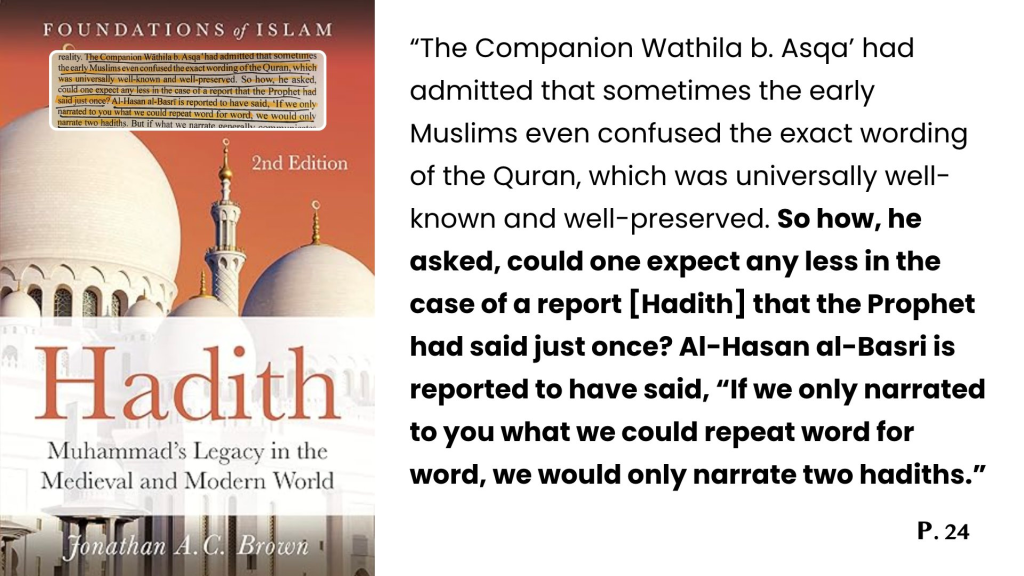
The Companion Wathila b. Asqa‘ had admitted that sometimes the early Muslims even confused the exact wording of the Quran, which was universally well-known and well-preserved. So how, he asked, could one expect any less in the case of a report that the Prophet had said just once? Al-Hasan al-Basri is reported to have said, If we only narrated to you what we could repeat word for word, we would only narrate two hadiths.
Hadith Muhammad s Legacy in the Medieval and Modern World p. 24
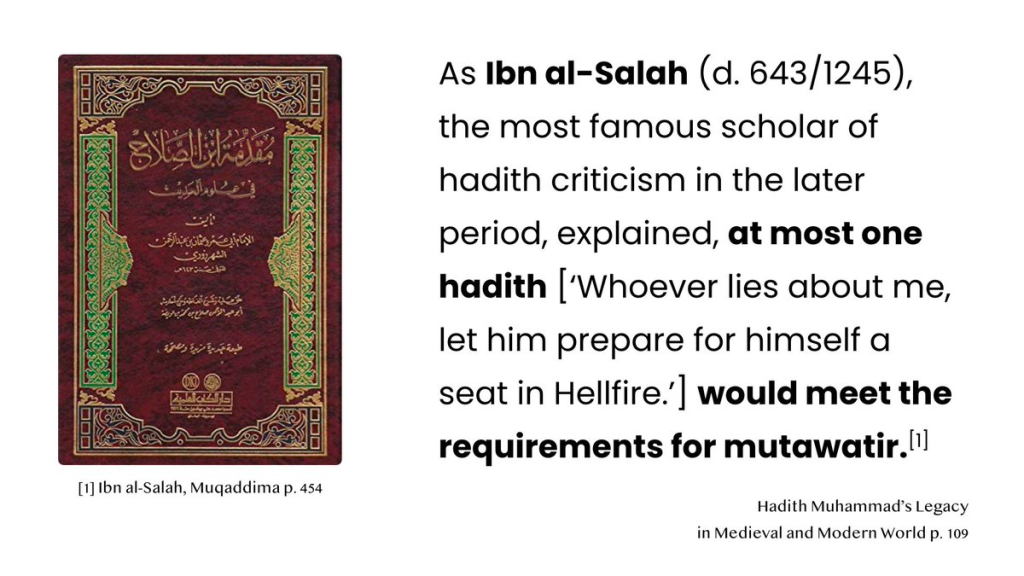
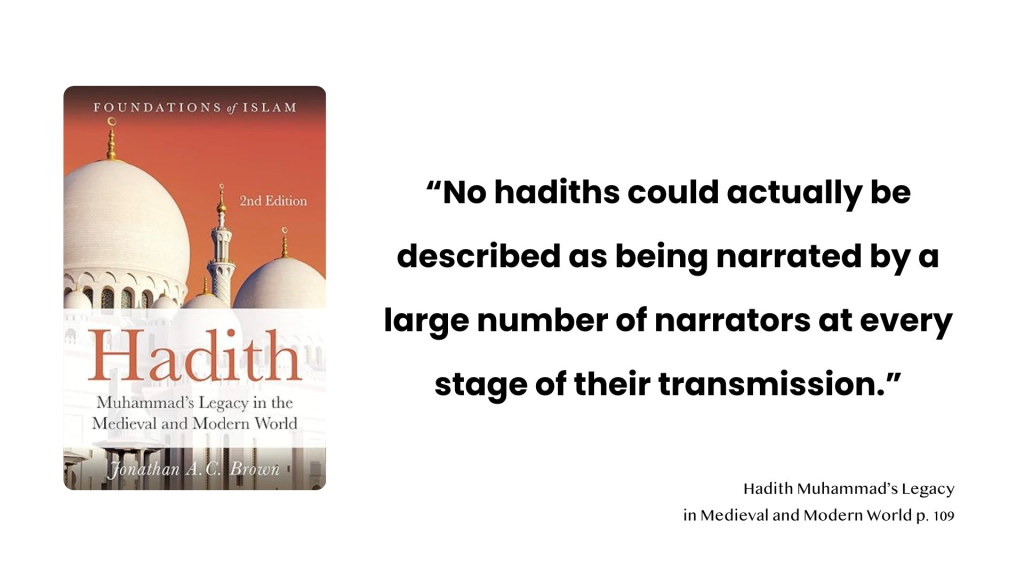
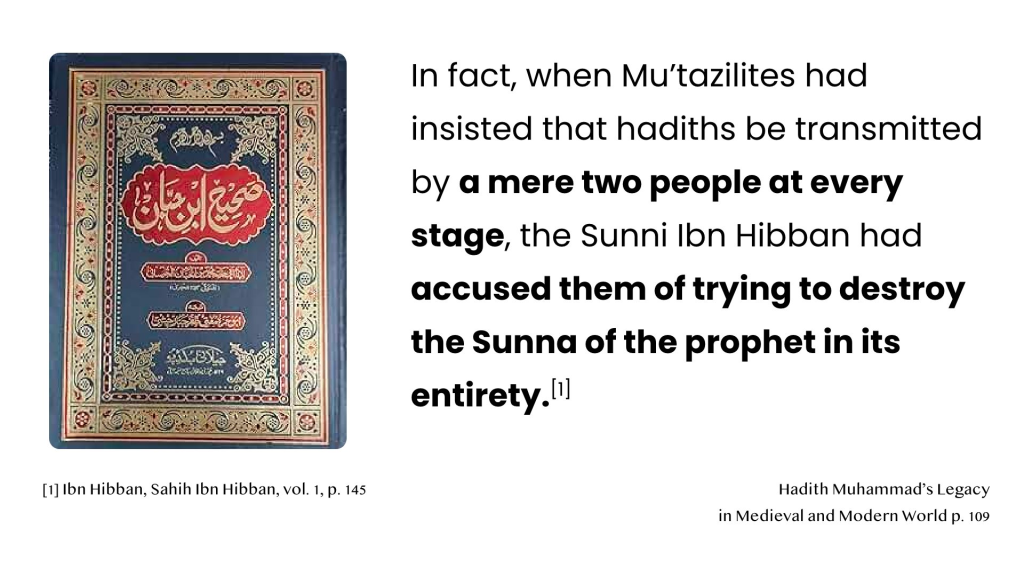
In addition to the oral recitation, there has been a deliberate effort throughout history to preserve the Quran. This was not the case for the Hadith. Not only was there zero effort from the earliest Caliphs, Abu Bakr, Umar, Uthman, and Ali to preserve the Hadith, but they actually went out of their way to reduce the spread of Hadith and pressured people to follow only the Quran.
Even if we look at the historical manuscripts. We have many manuscripts of the Quran that date to the life of the prophet, but the earliest manuscript of the Hadith is a single page of the Muwatta by Imam Malik dating to ~179 AH. When it comes to Bukhari, the oldest Arabic manuscript of his Sahih is dated 407 AH (1017CE) and only contains books 65 through 69, with book 65 being incomplete. The oldest full manuscript is a version narrated by Abu Dharr al-Heravi (d. 1043CE) and is kept at the Süleymaniye Library in Istanbul, and is dated to 1155CE / 550 AH. Another complete manuscript version is kept at Chester Beatty Library in Dublin, Ireland (no. 4176). It was copied by Ahmad bin Ali bin Abdul Wahhab and was dated 28 November 1294CE / 8 Muharram 694 AH.
Additional articles on the subject:
- Forbidding Writing Hadith
- The Oldest Hadith Manuscripts
- The Oldest Quran Manuscripts
- Preservation of Quran vs. Hadith
- Preservation of the Quran, Past and Future
Trust the Isnad
Traditionalists believe that because a Hadith has an isnad that, therefore it must be authentic, but again, there are a lot of problems with this kind of reasoning. The most notable is that there is no guarantee that the isnad is valid. This is because people have been fabricating isnad just as rampantly as they were fabricating Hadith.
To put in perspective the number of inauthentic Hadith that were in circulation during the Sahih compilations in the 3rd century Hijra, Bukhari himself claimed to have written over 10 million Hadith and memorized the chain of every single one. As absurd as this claim is, he also claimed in the same excerpt below that he struggled to remember the names of his relatives.
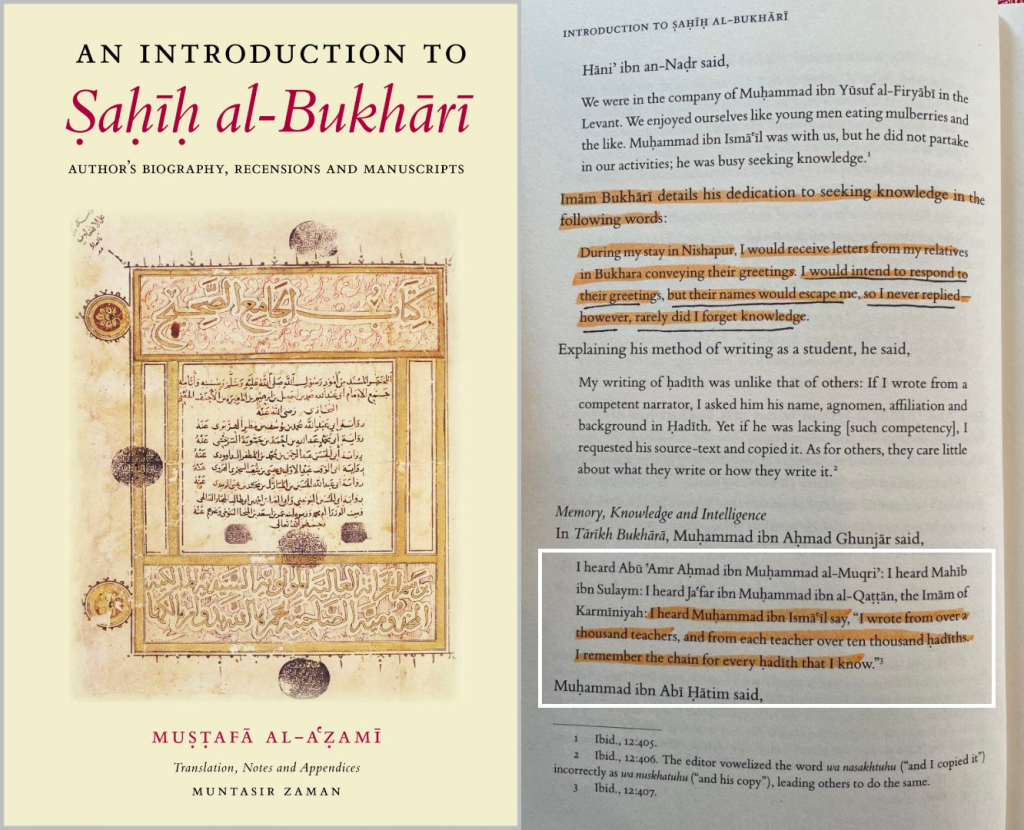
The compilations of Kutub al-Sittah began around the year 850 CE. If we look at the respective compilers, we see that they went through hundreds of thousands of Hadith and determined that ~99% of the hadith they reviewed were either not Sahih, according to Bukhari or Muslim, or failed to even rank as Daif, according to the other compilers.
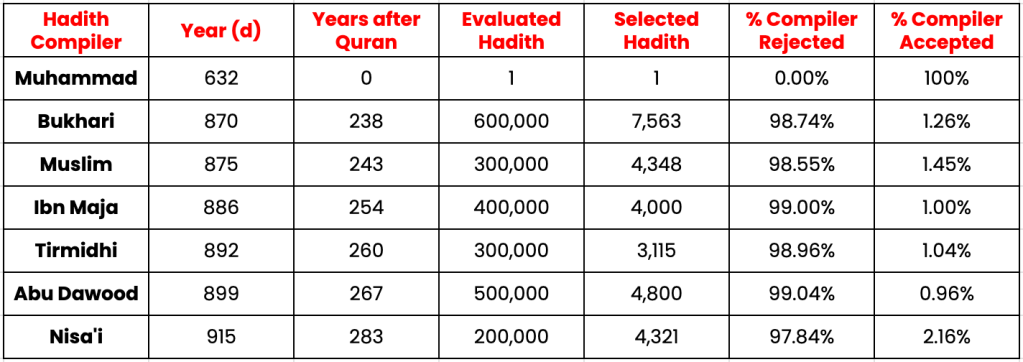
Ibn Hanbal (d. 855 CE) is said to have gone through some 750,000 Hadith and included in his Musnad any Hadith he thought could be remotely truthful, including narrations later proven to be forgeries. He believed anything that was not included in his compilation was a fabrication. This would mean he considered ~720,000 of the Hadith he reviewed fabricated. All this shows that the vast majority of Hadith in circulation were fabrications and that people were fabricating isnads along with their Hadith.
Traditionalists claim that their biographies can attest to each of the narrators in a chain of Hadith, except these biographies were not created until the 3rd century. But none of these manuscripts exist today, and most are dated to the 5th and 6th century Hijra. So to trust the isnad would imply having to rely on the ability of a person to be able to determine the trustworthiness and reliability of someone who lived hundreds of years before them and possibly thousands of miles away.
Even the request to ask for two witnesses for each of the transmitters was enough to cause ibn Hibban to claim that such requirements would destroy the entire Sunna of the prophet.
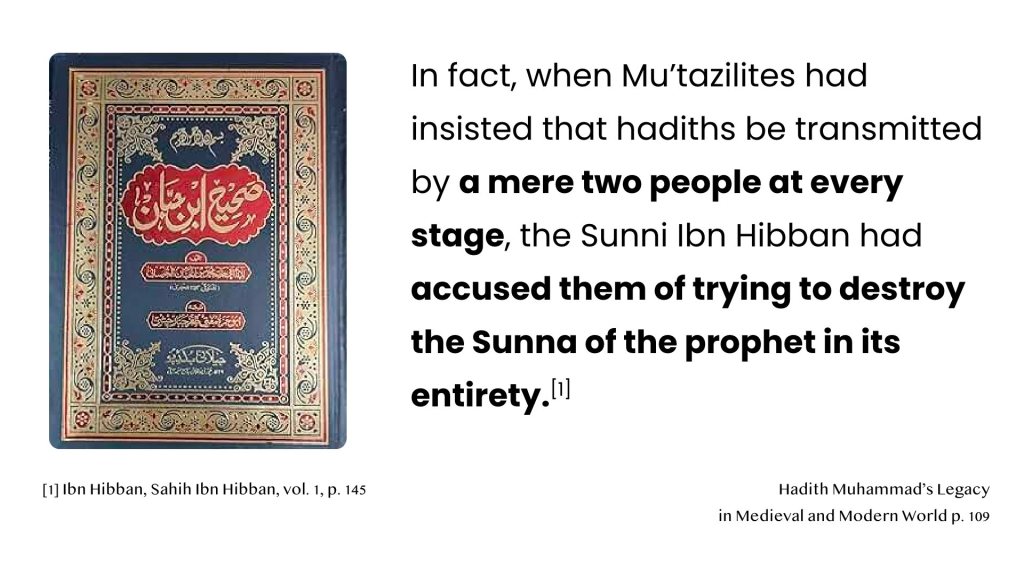
Additionally, compilers and scholars constantly disagreed regarding which Hadith they considered authentic. Since there is no consistent approach to grading the authenticity of Hadith, the isnad, like the rest of the Hadith sciences, is at best a pseudo-science but more realistically a complete farce.
Further Reading:
- When Sahihs Disagree
- 4 Witnesses & Hadith
- The Fallibility of Companions
- Gaming Isnads
- Hadith Fails the Authenticity Test
How can the majority be wrong?
Sunnis usually make a plea to say that it is impossible for the majority of Muslims to be wrong. The irony regarding this level of reasoning is that they have no problem saying that the billions of Christians, Jews, Hindus, etc. are wrong. They typically rebut by saying that they are different because they are “Muslims” and therefore cannot be wrong. As if simply calling oneself a Muslim puts someone in the right. And since they self-proclaimed themselves as believers, they arrogantly cite the following verse to show that followers of the Quran are commanded to follow the believer’s way, which they imply is their way.
[4:115] As for him who opposes the messenger, after the guidance has been pointed out to him, and follows other than the believers’ way, we will direct him in the direction he has chosen, and commit him to Hell; what a miserable destiny!
وَمَن يُشَاقِقِ ٱلرَّسُولَ مِنۢ بَعْدِ مَا تَبَيَّنَ لَهُ ٱلْهُدَىٰ وَيَتَّبِعْ غَيْرَ سَبِيلِ ٱلْمُؤْمِنِينَ نُوَلِّهِۦ مَا تَوَلَّىٰ وَنُصْلِهِۦ جَهَنَّمَ وَسَآءَتْ مَصِيرًا
However, being in the majority does not mean Sunnis represent “the believer’s way.” The Quran actually warns about the majority.
[12:103] Most people, no matter what you do, will not believe.
(١٠٣) وَمَآ أَكْثَرُ ٱلنَّاسِ وَلَوْ حَرَصْتَ بِمُؤْمِنِينَ
[12:106] The majority of those who believe in GOD do not do so without committing idol worship.
وَمَا يُؤْمِنُ أَكْثَرُهُم بِٱللَّهِ إِلَّا وَهُم مُّشْرِكُونَ
The Quran also shows that the majority not only lead people astray, but specifically lead away from the Quran.
[6:112] We have permitted the enemies of every prophet—human and jinn devils—to inspire in each other fancy words (Hadith), in order to deceive. Had your Lord willed, they would not have done it. You shall disregard them and their fabrications.
[6:113] This is to let the minds of those who do not believe in the Hereafter listen to such fabrications, and accept them, and thus expose their real convictions.
وَكَذَٰلِكَ جَعَلْنَا لِكُلِّ نَبِىٍّ عَدُوًّا شَيَـٰطِينَ ٱلْإِنسِ وَٱلْجِنِّ يُوحِى بَعْضُهُمْ إِلَىٰ بَعْضٍ زُخْرُفَ ٱلْقَوْلِ غُرُورًا وَلَوْ شَآءَ رَبُّكَ مَا فَعَلُوهُ فَذَرْهُمْ وَمَا يَفْتَرُونَ
وَلِتَصْغَىٰٓ إِلَيْهِ أَفْـِٔدَةُ ٱلَّذِينَ لَا يُؤْمِنُونَ بِٱلْـَٔاخِرَةِ وَلِيَرْضَوْهُ وَلِيَقْتَرِفُوا۟ مَا هُم مُّقْتَرِفُونَ
[6:114] Shall I seek other than GOD as a source of law, when He has revealed to you this book fully detailed? Those who received the scripture recognize that it has been revealed from your Lord, truthfully. You shall not harbor any doubt.
[6:115] The word of your Lord is complete, in truth and justice. Nothing shall abrogate His words. He is the Hearer, the Omniscient.
أَفَغَيْرَ اللَّهِ أَبْتَغِي حَكَمًا وَهُوَ الَّذِي أَنْزَلَ إِلَيْكُمُ الْكِتَابَ مُفَصَّلًا وَالَّذِينَ آتَيْنَاهُمُ الْكِتَابَ يَعْلَمُونَ أَنَّهُ مُنَزَّلٌ مِنْ رَبِّكَ بِالْحَقِّ فَلَا تَكُونَنَّ مِنَ الْمُمْتَرِينَ
وَتَمَّتْ كَلِمَتُ رَبِّكَ صِدْقًا وَعَدْلًا لَا مُبَدِّلَ لِكَلِمَاتِهِ وَهُوَ السَّمِيعُ الْعَلِيمُ
[6:116] If you obey the majority of people on earth, they will divert you from the path of GOD. They follow only conjecture; they only guess.
وَإِنْ تُطِعْ أَكْثَرَ مَنْ فِي الْأَرْضِ يُضِلُّوكَ عَنْ سَبِيلِ اللَّهِ إِنْ يَتَّبِعُونَ إِلَّا الظَّنَّ وَإِنْ هُمْ إِلَّا يَخْرُصُونَ
Additional Reading:
- The Golden Calf of Islam
- Know Your Enemy (Satan in Quran vs. Hadith)
- Invisible Mountains and Hadith
- Hadith Contradicts Quran
- Whoever lies about the prophet
- Was the prophet ever bewitched?
- Seven Ajwa Dates & Poison
- Fallibility of the Companions (Sahaba)
- Ibn Sayyad: The Dajjal That Never Was
A comprehensive list of Problematic Sahih Hadith

your amazing. Thank you for spreading the truth even if majority of Muslims shame us for believing the true Islam and following god and the Quran alone. Judgment day will come for us all and I can’t wait to see the faces of the Sunni and Shia and other false sects when they will be judged for how wrong they were. Not only do these sects claim the Quran needs hadiths but they also shame ridicule those who oppose them. How sick is it that so called Muslims persecute us simply because we want to follow the Quran as god wanted us to do in the first place. The devil is very smart.
LikeLike